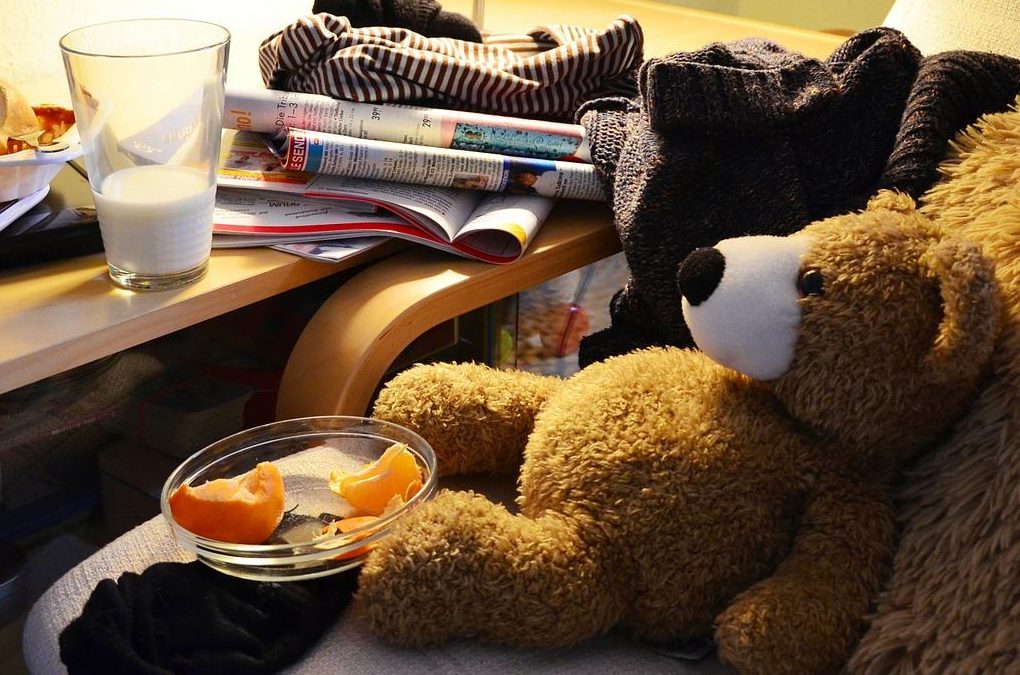On Sunday I went to help my daughter tidy her room. Well it took me two hours to “find” the floor and the bench top in her room.
I know that some of you also have similar problems with your children whatever their age. I have friends whose sons/daughters do not have BPD but still cannot manage to keep their house or room relatively tidy. And I don’t mean not vacuuming regularly or having a few dirty dishes on the sink. In my daughter’s case it means clothes on the floor, empty tablet foils on the floor, books and magazines on the floor and glasses and mugs that should have been taken back to the kitchen covering her bench top. And then of course there were the, sometimes, unopened bottles of perfume and make up. Luckily she doesn’t take food into her room but I know of others who have stacks of dirty plates growing mould and empty take away food containers also mouldy.
So, knowing that my daughter was not the only one who was so untidy and believing that it was part of her mental illness I did a search. The article below is what I found.
I hope this article helps you understand why this untidiness and messy living happens and that you can accept this as another aspect of mental illness that is not one of the “diagnostic criteria”.
I hope it helps you to be more understanding, (it has me) and helps lower your stress levels as you help your loved ones keep their accommodation clean and more importantly perhaps, not such a health hazard.
Judy
From iNews, September 2016:
Photo of untidy bedroom shows the stark reality of depression
“I suffer from severe depression and have a really hard time with cleaning and doing other kinds of household work. My room has been this messy for several months because I can’t push myself to take care of it. But this Friday I decided to finally do it!” This person, known only as @OP, suffers depression.
Following the clean-up, @OP said: “I know it’s not a big victory, but for me it means the world to just be able to have my door open if people come over. I feel so at peace right now.”
“Me 1 – Depression 0” they added.
Why tidying a room could be difficult for someone with depression?
The signs of depression are low mood, less energy, feeling less able to do things, losing interest in previously enjoyable activities, loss of concentration, problems sleeping, different eating patterns, feeling guilty or worthless, having thoughts of self-harm or suicide What may seem like a simple, everyday household chore can be a big step for people suffering from depression.
That’s because severe depression can be “debilitating” and drain people of their motivation, Marjorie Wallace, the chief executive of SANE, told us.
“An untidy room can reflect the chaos and confusion people fighting depression may feel in their minds,” said Wallace. “That makes the image of the tidied room all the more remarkable, as a symbol of positive progress.”
Climbing Mount Everest
Nia Charpentier, of Rethink Mental Illness, said depression affected people in many different ways and that something “seemingly simple” like tidying a room could seem “like climbing Mount Everest”.
“Dismissing symptoms could make the person feel even worse than they already do, and further ingrain stigma and misunderstandings around depression,” she added
Dennis Thompson Jr, writing for Everyday Health in 2010, says “People with depression can find themselves too lethargic and listless to clean up around the house. You may attempt to self-medicate through consumerism — purchasing items you don’t really need to make yourself feel better. As a result, piles of possessions can begin to build up around your home during a depressive episode”
More posts like this:
Browse our Website by Subject
Main Subjects: Caring for Someone with BPD, Events, Getting Help, Living with BPD, Research, BPD in the Media
Other Subjects: Advocacy, BPD Awareness Week, Couples and Families, Family Connections Course, National BPD Conference, New Member, Sanctuary Meetings, Treatment, Validation, What is BPD
Are you new to all of this? click here
This website is produced by members of the Sanctuary Support Group. We are not mental health professionals nor clinicians. We are ordinary people who care for someone with BPD. This website is a collection of information that we have found helpful or of interest in the context of our own lived experiences. The content of this website is not a substitute for independent professional advice, diagnosis or treatment.
If there is a problem with our website, please contact us here

